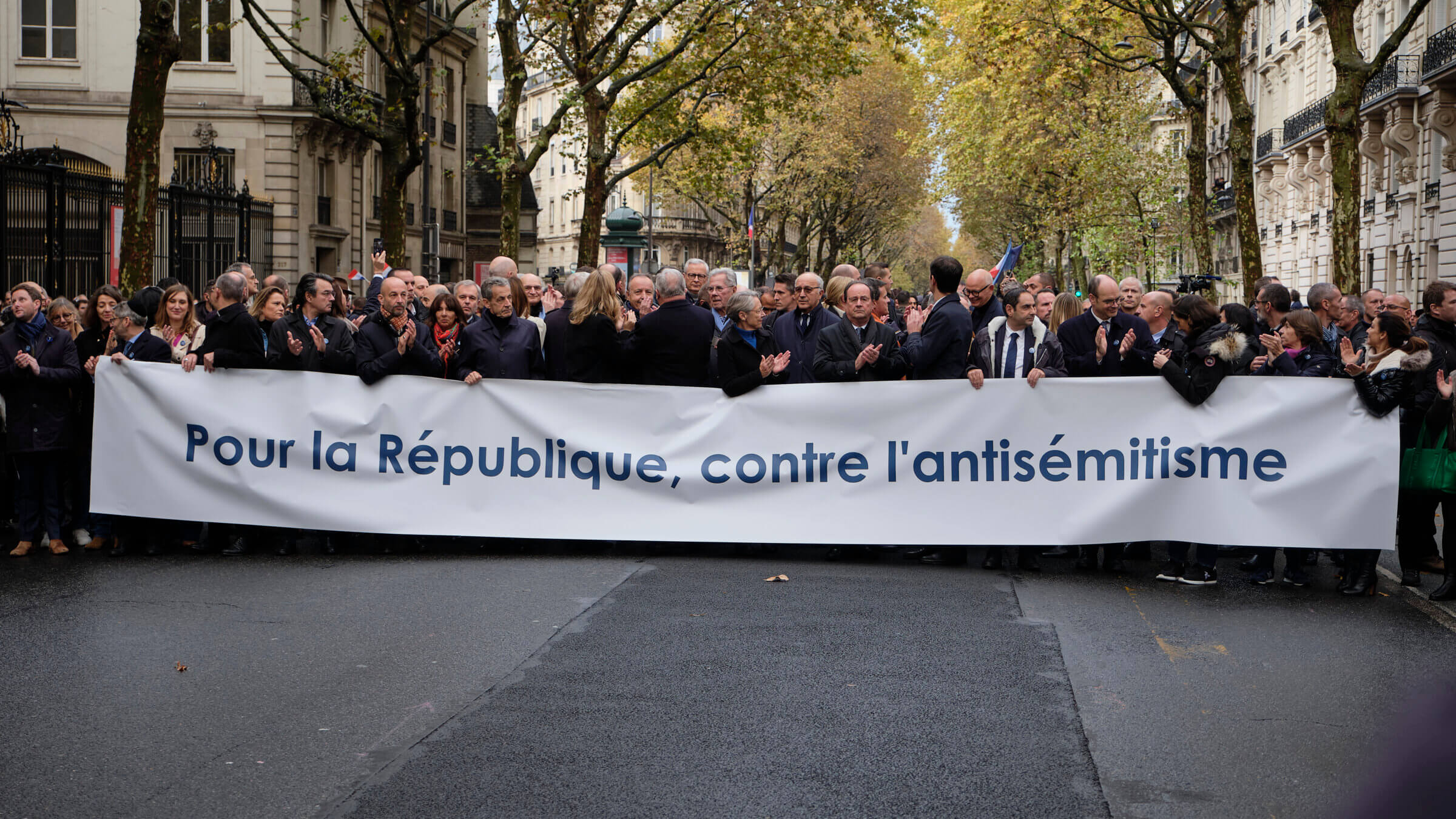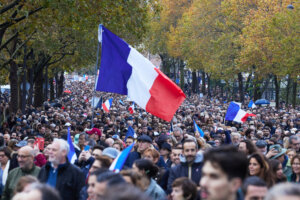In Paris, a march against antisemitism draws wide support — even, some might say, from antisemites
Marine Le Pen and her Rassemblement National party drew more than a few raised eyebrows as they marched against antisemitism

Former French Presidents Nicolas Sarkozy and Francois Hollande were among those at the French march against antisemitism. Photo by Getty Images
On Sundays, while Americans take to the stadiums to support their teams, the French instead take to the streets to support their causes. A gross generalization, of course: la manif — short for la manifestation or protest march — is not, as is often quipped, France’s national sport. But it is a national ritual that, stretching back to 1789, embodies the enlightened and egalitarian principles that hatched the Revolution (and several subsequent revolutions) and the Republic (and, yes, several subsequent republics).
This past Sunday, the ritual was again performed in several cities across France. It was a protest aimed at neither a government nor an institution, but instead at an ideology: antisemitism. Responding to a call by the leaders of France’s two legislative branches, the National Assembly and Senate, more than 100,000 people joined a protest march in Paris against antisemitism, while tens of thousands of others marched in several other cities.
The reasons for the march were pressing. More than 1,500 antisemitic acts, ranging from painted graffiti to physical assaults, have taken place in France since the Hamas massacre last month. Predictably, the pace of such acts has quickened since the Israeli military launched its invasion of Gaza. What few would have predicted in 2022, though, is that the total number of such acts that year would be more than tripled over just four weeks this year.
While similar increases have occurred across Europe, this meteoric rise is especially alarming in France. The country is home to the largest Jewish and Muslim populations in Europe. (While the actual numbers are not known — the government, informed by its republican values, does not identify citizens by religion or ethnicity — approximately half a million Jews and more than 3 million Muslims live in France.)

France’s relationship with both communities is, to put it mildly, complicated. These complications issue, in part, from France’s role as a colonial power in North Africa and the Middle East. Hundreds of thousands of men, women and children whose parents or grandparents were colonized by the French are themselves French citizens. Inevitably, this complex cultural, political and social legacy has carried great benefits but also great burdens, the latter exemplified by the despair and dilapidation of the suburbs where many of these citizens live.
France’s recent history is equally troubling for French Jews. There is not just France’s role, embodied by Vichy, in the Final Solution, but also the nation’s influential role in the invention of antisemitism as one of the deadliest ideologies of the modern era. From the late 19th century and Édouard Drumont’s best-selling La France juive through the antisemitic legislation of Vichy and Louis-Ferdinand Céline’s Bagatelles pour un massacre (no need to identify those who were to be massacred) to Jean-Marie Le Pen, founder of the neo-fascist National Front and amateur historian who has always insisted the Final Solution was a “detail of history,” France has long been a fount of antisemitic fantasy and fearmongering.
Indeed, the inconvenient details of the National Front’s origins made Sunday’s march pas comme les autres. Compared to most demonstrations, which are either festive or feisty, peppered with banners and signs, and echoing with chants or songs, Sunday’s march, wrapped mostly in silence, seemed like kabuki performance. It was led by the centrist prime minister Élisabeth Bourne, who was flanked by two former presidents, the conservative Nicolas Sarkozy and socialist François Hollande. Not far behind were the leaders of the principal political parties, ranging from the communists to the conservatives, most of them sporting the blue, white and red sash of the French Republic.
Here, though, entered a couple of new riffs on the history of antisemitism. First, Marine Le Pen, the daughter of Jean-Marie Le Pen, insisted on joining the demonstration. After inheriting the National Front from her father more than a decade ago, she rebaptized it as the Rassemblement National, or National Rally, and sought to make it respectable by exorcising its neo-Nazi and antisemitic past. Le Pen’s efforts were crowned with success in the most legislative elections, which transformed her father’s marginal movement into the largest opposition party in the National Assembly.
But no matter how respectably the Hulk dresses, his true character will sooner or later burst out, splitting the seams of his clothing and endangering anyone in the vicinity. Shortly before the demonstration, Le Pen’s second-in-command Jordan Bardella insisted in an interview that the elder Le Pen was not antisemitic, even if the Holocaust being a “detail of history” was an unfortunate turn of phrase. So, too, was his earlier claim that French Jews could depend upon the RN being their “shield” against antisemites — a phrase once used by Vichy apologists to describe its role in protecting the French against the Nazis. Bardella’s maladroit phrases only reinforced the decision by the other parties to form a “republican front” — i.e., sanitary barrier — against the RN by refusing to march in its vicinity.
This would have been a difficult task even without such a front, since Le Pen and Bardella, wearing black coats and bleak smiles as they walked side by side, were surrounded by a squadron of the party’s security force. Despite the hostile welcome from the other parties, Le Pen was not daunted. When asked by a reporter whether she had second thoughts about her decision to march, Le Pen firmly replied, “We are exactly where we should be.”
We might conclude that Le Pen’s decision was driven less by moral convictions than political calculations. What should we conclude, though, about the leader of another major political party who had already decided, several days before, that he and his party should not be at the march? Jean-Luc Mélenchon, the founder of the extreme-left La France insoumise (“Defiant France”), declared that his party would not participate. Instead, they would hold a parallel demonstration to mark the 85th anniversary of the round-up and deportation of Jews in Paris by the French police and government officials. (Several members of LFI, led by the remarkable filmmaker-turned-politician François Ruffin, disagreed with the party line and participated in a similar march in Strasbourg.)
Not only did Mélenchon’s decision send yet another tremor through the already fragile left-wing coalition he built after last year’s legislative elections, but it also sent a considerable tremor through an even more fragilized French Jewish community. When it comes to Israel, the language used by Mélenchon — described by the media as a “firebrand” more often than Homer describes Achilles as “fleet-footed” — has often been perceived as antisemitism parading as anti-Zionism. His remarks since Oct. 7 have done little to contradict this impression.
Shortly after the organizers announced plans for the demonstration, Mélenchon had denounced it as a sleight of hand. Antisemitism, he affirmed, was only a “pretext” for the march. The real reason, he insisted, was to serve as a “rendezvous for those who unconditionally support the massacre of Palestinians.” His subsequent rationale for dodging the demonstration: that it was “unpractical to march side by side with a Nazi party.”
By “Nazi party,” Mélenchon of course meant the Rassemblement national. Fair enough, perhaps. But his claim that the march assembled all those bent on the slaughter of Palestinians is, to again put it mildly, less than fair. Yet it reveals just how French politics and society have changed since 1990, when the desecration of the cemetery in the southern city of Carpentras rallied an entire nation, including its president, François Mitterrand, to voice its indignation by taking to the boulevards. More than three decades later, France is exactly where it should not be.






















